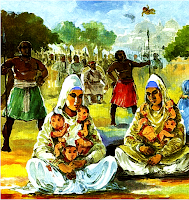By : simranjeet singh Columbia University.
Last weekend, I had the unenviable task of teaching Sikh children about the massacre in Oak Creek.
The kids sat at picnic tables overlooking a lake at sunset at a
summer camp in New York state. They chattered excitedly in anticipation
of the evening campfire that was to follow. I stood in front of them
trying to compose my thoughts, wondering if children in elementary
school could even comprehend what happened. I stroked my beard
nervously, looked around the class and decided to find out what the kids
already knew.
"Today, I want to talk about something really sad and important. How many of you know what happened in Oak Creek, Wisconsin?"
Dozens of hands darted toward the sky - each of the 40 kids had heard
about the mass shootings. I asked for volunteers willing to tell the
story, and 40 eager hands shot up again. A young boy in a shiny blue
turban stated that someone went into a
gurdwara and started shooting people. A girl in a green tank top confessed that she is "scared to go to
gurdwara now because other people might try hurt us."
A third young girl, who had just lost her first front tooth that day,
waited patiently for me to call on her. I finally pointed in her
direction, and her words sent shivers down my spine:
"A white Christian man came and killed a bunch of us. He didn't like us because we are different."
In some ways, her innocuous statement was problematic and, in other ways, profound.
The second part of her analysis captured key aspects of the Sikh
experience in America. We have been targeted because people have
perceived us as being different. That's a simple fact.
On the other hand, the first part of her analysis was troubling. I
was struck by her characterization of the killer and, for the first
time, realized that we need to guard against the construction of white,
Christian males as "the other."
How the tables had turned.
In order to make sure the kids weren't generalizing or stereotyping
Christians, I called attention to one of the heroes of Oak Creek, Police
Lt. Brian Murphy. In pointing out that he was also a white, Christian
male, I was able to effectively communicate the problem of projecting
individual actions onto larger communities.
The young Sikhs grasped the importance of this point more quickly
than I expected, and, in retrospect, I realize that this is probably
because of their own experiences in being bullied and harassed.
After ensuring that the kids understood this elementary point, I moved on to a more challenging idea.
"In Sikhi, we believe that God is in everything and everyone. Has anyone heard that before?"
All the kids confirmed my expectation by nodding their heads in
unison. I asked them to give me examples of where God is present, and
they pointed to the nature around us, including trees, lakes and ducks. I
asked about mundane objects in direct sight, such as benches, pencils
and plastic cups. The kids were sharp - they quickly got the point and
exclaimed excitedly: "Oh, yeah! God is in those things, too, because God
is everywhere!"
I explained that recognizing God's presence everywhere means that
Sikhs are expected to love everything and everyone equally. I asked the
students to look in each other's eyes and try to see God in each other.
It was beautiful to see their eyes light up with newfound enthusiasm and
respect.
Then came the hard part. One of the more thoughtful students raised his hand with a confused look on his face.
"If you say God is in everybody, are you saying that God was even in that man who killed the Sikhs in Wisconsin?"
I loved the question, which reflected the same sort of compassion,
discontent and critical engagement, expressed by people of faith around
the country. The entire class had fallen silent, and I could see the
boys and girls struggling to make sense of it all.
I encouraged them to think about it for half a minute, and they came
up with an impressive range of critical thoughts. Their responses
essentially fell into two categories: Some believed that the shooter did
not have any God in him, and others believed that he did.
One 11-year-old raised her hand shyly and nervously adjusted her
pink-framed glasses as she spoke: "I believe the killer had God inside
of him, but he chose not to listen to God and so he did a bad thing. He
didn't see God in other people, and that's why he could hurt them."
Her answer touched me to the core - she had articulated my
understanding of Sikh theology more simply and precisely than I could
have ever imagined.
I can only imagine what our world would be like if we were as mature
as this 11-year-old, wise enough to distinguish between people and
actions. She echoed the Sikh theological perspective that our enemies
are not particular individuals or peoples; rather, we seek to eradicate
human tendencies that bring suffering in this world, such as ego, greed
and anger.
I explained to the class that although Wade Michael Page did a
terrible thing by hurting so many people, Sikhs believe that he still
had God inside of him.
Speaking to the children raises an important issue for us to
consider. The challenge for Sikhs is to determine how we will react to
Page and others who commit hateful acts. How will we respect the
godliness in our greatest foes, and how will we teach our children and
younger generations to accept and grow after such devastation?
This perhaps will be our greatest obstacle in the months and years to come.
Simran Jeet Singh a doctoral candidate in religion at Columbia University.








